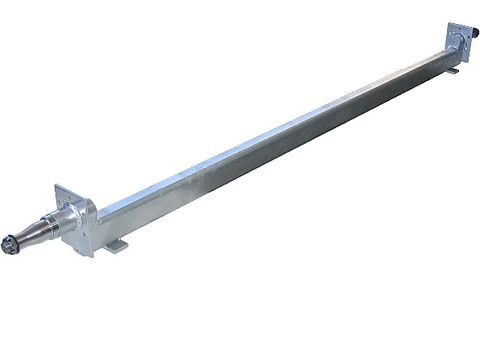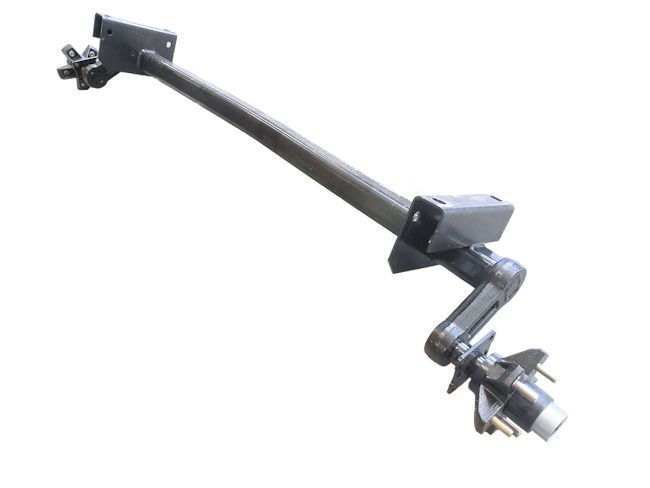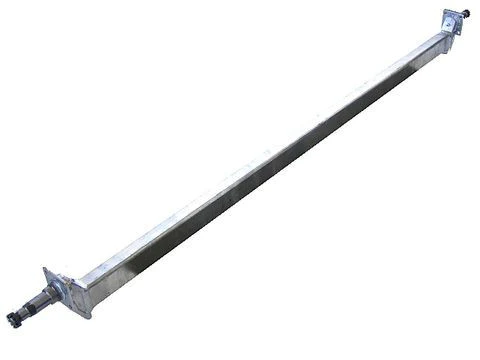Product Description
1) 6″ Square Axle – 12mm, 14mm wall thickness.
2) Twin tyre steel wheel fixings are standard. ISO single wheel and twin tyre aluminum wheel fixings are also available.
3) Standard track length – 1840mm, other track lengths are also available.
4) All axles include standard manual slack adjuster, auto slack adjuster is optional.
5) Bearing size/type : 13 Tons Inner-HM518445/10 Outer-HM518445/10
16 Tons Inner HM220149/10 Outer- HM518445/10
6) All Axles are available with ABS ready Kits (Optional)
We are a group of professionals with decades of experience in the industry. We pooled our talents and knowledge together to form this manufacturing company to bring our experience to supply quality product to the market at competitive prices.
We have a strong technical team, with many years of practical experience and strong R&D team to bring unique designs and improvements to the market. We also supply customised solutions to suit niche markets.
We are internationally certified in our operations.
We have partnered with market leaders in supplying components since 2013.
We always believe in supporting our customers and have established regional after sales support channels.
1.Q: Are you a manufacturer?
A: Yes, we are a manufacturer located in ZheJiang province which in the manufacturing center of construction machinery. We have passed ISO and CE certificate and our products have been exported to over 20 countries.
2.Q: Why choose us?
A:With our 2 factories and more than 100 workers, we only produce very high quality products.2 Years warranty and only 1% repair rate during the past 10 years, which is cost effective and win good reputation.
3.Q: Can you produce customizable machines?
A: Yes, we can provide customizable machines according to your requirements. We have 8 senior engineers and can design and supply higher configuration.
4.Q: How about your After-sales service?
A: We have 3 after sales, and can provide 24-hour technical support by phone and email.
5.Q: What is your lead time?
A: Normal goods usually take 7-10 days, and customization takes 15-25 days
6.Q: Is it convenient to visit your factory? How to go there?
A: Warmly welcome to visit our factory. When you arrive, we will pick you up.
| After-sales Service: | Local After Service |
|---|---|
| Warranty: | One Year or 10,000km |
| Type: | Axle |
| Certification: | ISO/TS16949, ISO, CE |
| ABS: | With ABS |
| Axle Number: | 1 |
| Customization: |
Available
| Customized Request |
|---|

What are the legal regulations or guidelines regarding trailer axle weight limits?
Trailer axle weight limits are subject to legal regulations that vary by region and are designed to ensure road safety and preserve infrastructure. Here are some common guidelines:
- Maximum Weight Limits: Most regions specify the maximum allowable weight on a single axle, tandem axles, or multi-axle configurations.
- Gross Vehicle Weight Rating (GVWR): Trailers are assigned a GVWR, indicating the maximum weight they can legally carry, including cargo and the trailer’s own weight.
- Per-Axle Weight Limits: Legal limits restrict the weight any single axle or axle group can carry. These limits can vary by axle spacing.
- Weight Distribution: Regulations often require proper weight distribution between axles to prevent overloading a particular axle.
- Permits for Oversized Loads: Transporting loads exceeding standard weight limits may require special permits and adherence to specific regulations.
- Axle Spacings: Legal restrictions may govern the distance between axles or axle groups, affecting weight distribution.
- Tire Load Ratings: Trailer tires must meet or exceed the expected load, and tire ratings impact weight limits.
- State and Local Regulations: In the United States, weight limits can vary by state and locality, so it’s important to be aware of and comply with local laws.
It’s crucial for trailer owners and operators to understand and adhere to these regulations to ensure safe and legal operation. Non-compliance can result in fines, road safety hazards, and damage to roads and bridges.

What is the impact of trailer axle alignment on tire wear and performance?
Proper trailer axle alignment is crucial for tire wear and overall performance. Misaligned axles can lead to a range of issues:
1. Uneven Tire Wear:
– Axle misalignment can cause tires to wear unevenly. For example, excessive toe-in or toe-out (the angle of the tires relative to the trailer’s centerline) can lead to premature wear on the inner or outer edges of the tires. This not only reduces tire lifespan but also affects handling and safety.
2. Reduced Fuel Efficiency:
– Misaligned axles increase rolling resistance, which requires more energy to move the trailer. As a result, fuel efficiency can decrease, leading to higher operating costs.
3. Handling and Stability Issues:
– Axle misalignment can result in poor handling and reduced stability. Trailers may become more difficult to control, especially during braking and cornering, posing safety risks.
4. Overloading and Weight Distribution Problems:
– Misalignment can affect weight distribution. It may cause excessive weight on one axle, leading to overloading and potential legal issues. Balanced weight distribution is vital for safe and legal towing.
5. Axle Stress and Damage:
– Misalignment places additional stress on axles and suspension components. Over time, this stress can lead to component damage, potentially causing breakdowns and expensive repairs.
6. Trailer Drift:
– Misalignment can cause the trailer to drift or pull to one side, making it challenging to maintain a straight course, especially when driving at highway speeds.
7. Reduced Tire Lifespan:
– The combination of uneven tire wear, increased rolling resistance, and handling issues can significantly reduce the lifespan of trailer tires. This results in more frequent and costly tire replacements.
8. Safety Concerns:
– A misaligned trailer is less stable and more difficult to control, increasing the risk of accidents and compromising safety.
Alignment Solutions:
– To address axle misalignment, it’s essential to have the trailer inspected by a qualified technician. They can adjust the alignment by modifying the axle’s position and orientation. Precision alignment equipment is often used to ensure accuracy.
– Regular alignment checks and adjustments, as part of routine maintenance, can help prevent these issues and promote even tire wear and better performance.
– Properly aligned axles improve handling, safety, and tire longevity, making it a critical aspect of trailer maintenance.

Are there different weight capacities for trailer axles depending on the trailer type?
Yes, trailer axles come in various weight capacities, and the capacity depends on the specific trailer type and its intended use. Here are some common weight capacities for different trailer types:
1. Utility Trailers:
– Utility trailers often have single axles with weight capacities ranging from 1,000 to 3,500 pounds. These trailers are used for light-duty hauling and general-purpose applications.
2. Boat Trailers:
– Boat trailers can vary widely in weight capacity based on the size of the boat they are designed to carry. Smaller boat trailers may have weight capacities of 3,000 to 5,000 pounds, while larger ones can exceed 10,000 pounds.
3. Enclosed Trailers:
– Enclosed trailers, used for transporting cargo, merchandise, or personal items, can have weight capacities from 2,000 to 12,000 pounds or more, depending on their size and construction.
4. Flatbed Trailers:
– Flatbed trailers are available in various weight capacities to accommodate different cargo loads. Common capacities include 7,000, 10,000, and 14,000 pounds, among others.
5. Dump Trailers:
– Dump trailers, designed for hauling materials like gravel or construction debris, may have weight capacities ranging from 5,000 to 20,000 pounds, or even higher for heavy-duty models.
6. Car Hauler Trailers:
– Car hauler trailers, used to transport vehicles, typically have weight capacities of 7,000 to 14,000 pounds, depending on the number of axles and the size of the trailer.
7. Gooseneck Trailers:
– Gooseneck trailers are heavy-duty and often used for transporting large equipment or livestock. Their weight capacities can range from 10,000 to 30,000 pounds or more.
8. Specialty Trailers:
– Specialty trailers, such as equipment trailers, horse trailers, and concession trailers, have weight capacities tailored to their specific purposes and design.
– It’s crucial to select a trailer with an axle and weight capacity that matches the intended load. Overloading a trailer can lead to safety risks, damage to the trailer, and legal issues. Manufacturers provide weight ratings and guidelines for each trailer type to help buyers choose the right option for their needs.


editor by CX 2023-12-15